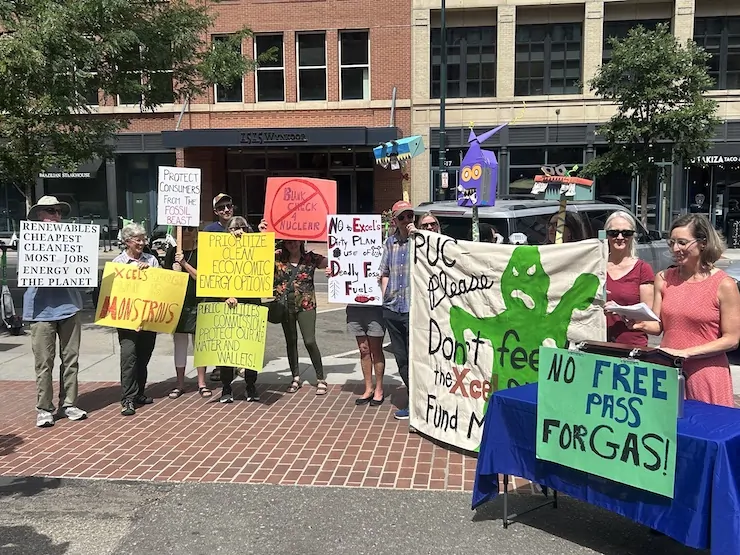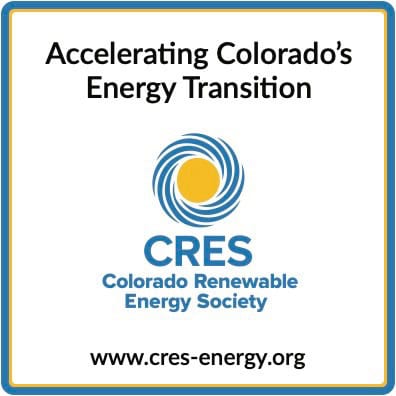Activists hope to put the heat on the Colorado PUC to tell Xcel Energy no, no, no in electric resource plan proceeding
by Allen Best
The pavement in Denver’s LoDo district was not yet hot enough for frying eggs but moving in that direction on Thursday noon when the speakers from several environmental organizations lined up to say their pieces.
Xcel Energy, they said, has a monster plan, and the Colorado Public Utilities Commission should reject most of what the utility proposes.
In keeping with the monster theme, Frankenstein stood at their side — until the heat became too much for him.
Frankenstein was only the beginning of the colorful mélange of made-for-TV messages. The local TV cameras were there.
“PUC — Please don’t feed the Xcel Slush Fund Monster,” was the largest sign.
“No Free Pass for Gas,” was another.
Frankenstein — it was Eric Frankowski of Western Clean Energy Campaign behind the black mask and black clothes — held a sign saying “Don’t let Xcel Claw at Money in your Wallet.”
Xcel Energy in October 2024 filed its just transition electric resource plan, so-named because it was supposed to help provide an off-ramp for those communities where it will be closing coal plants during the next several years. Xcel plans to be out of the coal-burning business in Colorado by 2031.
What comes next? A massive increase in new demand, much of it from new and expanded data centers, says Xcel, which had asked to add up to14 gigawatts of new generation.
Most of the new generation will come from renewables, but Xcel — like nearly all of Colorado’s electrical utilities — wants to add new gas plants. It also wants to create a fund that will allow it to experiment with new technologies as it goes forward. Among the possibilities? New nuclear but also carbon capture and sequestration. Or, who knows.
Speakers in the parking lot of the Alliance Center called this a slush fund, and to continue the theme they had produced a machine to deliver fruit slushies as the heat marched upward on its way to an eventual 98 degrees.
“Xcel is proposing two massive slush funds that would allow them to spend hundreds of millions of dollars, the first of which has no spending cap and would allow Xcel to invest in early-stage experiments with little oversight,” said Sara Kuntsler, of Mountain Mamas.
“This proposal is called the Carbon-Free Future Development Fund, and (it) would allow Xcel to spend an unknown amount of money on unproven technologies like carbon capture.
“The other is called the Strategic Resilience Reserve Fund, and it would let Xcel collect up to a half-billion dollars from ratepayers to pre-purchase gas plant equipment before the commission has even decided whether those need to be built.”
If that equipment goes unused and loses value, customers will pay, she went on, and if it proves successful — well, Xcel shareholders will pocket the profits and without taking risks.
“Even worse, these proposals come as Xcel is already backsliding on its commitments to reduce greenhouse gas emissions required under Colorado law. The company is falling short of its clean energy plan, the 86% GHG reduction target by 2030, and proposing to invest in at least 1,600 megawatts of new gas plants that will only further push us off track while burdening Coloradans, but not shareholders, with stranded assets.”
In contrast, Comanche 3, one of the coal plants being shut down, has a capacity of 750 megawatts.
Other speakers followed with similar themes.
“To the PUC, we’re asking you to be bold, to listen, to lead, to be on the right side of history,” said Patricia Garcia Nelson of Green Latinos.

“Monster was the theme” of a press conference in Denver’s LoDo on Thursday noon as several of Colorado’s smaller environmental organizations called for the Colorado PUC to tell Xcel Energy no to several of its proposals. Photos/Allen Best
From Indian Hills, in the foothills west of metropolitan Denver, Meg Reed reported that Xcel’s analysis had shown that electric rates could rise by nearly 50% in the next six years if this goes forward. “Xcel wants to build up to 14 times the generating capacity of the coal plant it’s retiring — not to meet the needs of everyday Coloradans, but largely to serve speculative demand from data centers and other large commercial operations.”
As for the gas plants, once they are no longer viable, “we will be left with stranded assets and the cost to decommission them. And again, those costs will land on customers like me.”
Jamie Valdez, had come from Pueblo, where he was born, to speak. “In Pueblo, like in other disproportionately impacted communities, we’ve been used for far too long as a sacrifice zone for bottom-of-the-barrel industries that give polished snake-oil sales pitches about how their facility will bring jobs and other economic benefits.”
Those jobs are less plentiful, he added, than the pollution.
Dr. Katherine Goff, a member of the Northglenn City Council, also worried about abandonment of emission reductions goals. Xcel had previously identified a goal of 86% reduction compared to 2005 levels. By law, it is required to achieve 80%.
As for the so-called slush funds, “why on Earth should ratepayers be forced to cover the costs of pre-purchased gas turbines before state regulators have a chance to ensure those gas turbines are necessary and affordable?”
Soon after, having attempted to put heat on the PUC, some of those protesting took refuge in the shade.
- Ridding Denver-area homes of gas - February 5, 2026
- Gearing up for data centers - February 3, 2026
- How Colorado sees the Colorado River stalemate - February 2, 2026






